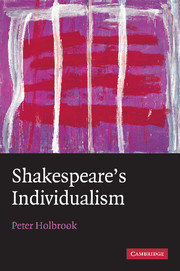Book contents
- Frontmatter
- Contents
- Acknowledgements
- Introduction
- PART I SHAKESPEARE, HAMLET, SELFHOOD
- PART II SHAKESPEARE AND EVIL
- 9 ‘Old lad, I am thine own’: authenticity and Titus Andronicus
- 10 Evil and self-creation
- 11 Libertarian Shakespeare: Mill, Bradley
- 12 Shakespearean immoral individualism: Gide
- 13 Strange Shakespeare: Symons and others
- 14 Eliot's rejection of Shakespeare
- 15 Shakespearean immoralism: Antony and Cleopatra
- 16 Making oneself known: Montaigne and the Sonnets
- PART III SHAKESPEARE AND SELF-GOVERNMENT
- Conclusion: Shakespeare's ‘beauteous freedom’
- Index
- References
16 - Making oneself known: Montaigne and the Sonnets
Published online by Cambridge University Press: 06 July 2010
- Frontmatter
- Contents
- Acknowledgements
- Introduction
- PART I SHAKESPEARE, HAMLET, SELFHOOD
- PART II SHAKESPEARE AND EVIL
- 9 ‘Old lad, I am thine own’: authenticity and Titus Andronicus
- 10 Evil and self-creation
- 11 Libertarian Shakespeare: Mill, Bradley
- 12 Shakespearean immoral individualism: Gide
- 13 Strange Shakespeare: Symons and others
- 14 Eliot's rejection of Shakespeare
- 15 Shakespearean immoralism: Antony and Cleopatra
- 16 Making oneself known: Montaigne and the Sonnets
- PART III SHAKESPEARE AND SELF-GOVERNMENT
- Conclusion: Shakespeare's ‘beauteous freedom’
- Index
- References
Summary
Simply the thing I am/Shall make me live.
All's Well That Ends Well, IV.iii.333–4.Describing Shakespeare as a poet of individuality and freedom might seem illegitimately to grant him attitudes and values that are part of the Romantic era (and its long aftermath) rather than the Renaissance. Anachronism is a peril in literary study. But we need to risk it if we are to discover real connections between authors from the past and our own age. After all, one reason Romantics and moderns may have thought Shakespeare the paradigm of the poet is that he anticipates their priorities, especially a profound (if often betrayed) commitment to self-realization. And notwithstanding the triumph of cultural historicism, few of us will feel content to subscribe to Edmund's view, in King Lear, ‘that men/Are as the time is’ (V.iii.30–1). Lionel Trilling said that the ‘intense conviction of the existence of the self apart from culture is, as culture well knows, its noblest and most generous achievement’. Shakespeare and the Elizabethans could surely imagine styles of life alien to their time and place. We can, so why shouldn't they?
As we have seen, one contemporary indispensable for thinking about Shakespearean authenticity is Montaigne. It is time to look more closely at Montaigne's thoughts on individuality and freedom – thoughts that are, it seems to me, closely aligned with Shakespeare's attitude towards these themes.
Emerson admired the ‘sincerity’ of Montaigne: ‘Cut these words’, he wrote, ‘and they would bleed; they are vascular and alive.’
- Type
- Chapter
- Information
- Shakespeare's Individualism , pp. 183 - 196Publisher: Cambridge University PressPrint publication year: 2010



